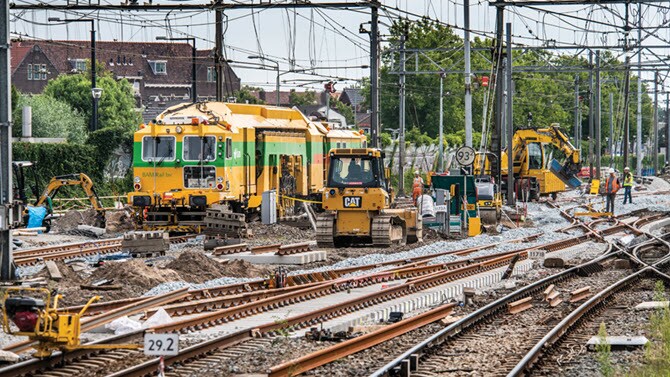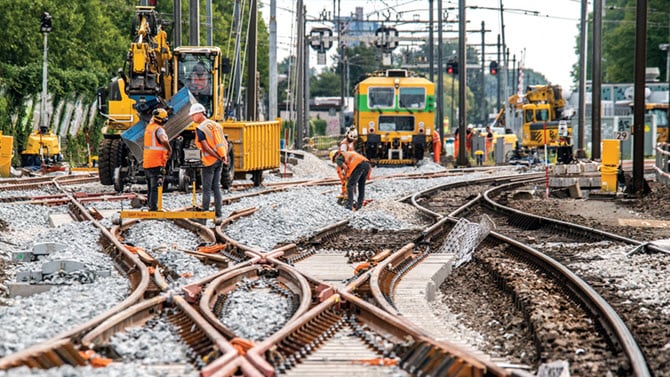
ProRail as an attractive employer
30/09/21
ProRail works hard on rejuvenation and to become more diverse
Our rapidly changing society requires ProRail to be more agile and decisive, and to have employees who can keep up with it in that regard. The rail infrastructure manager is currently in the midst of the necessary transformation. It wants to renew and become more diverse.
Raymond van Hattem, ProRail’s HR manager, has a clear view of what the organisation’s staffing should look like. 'We have to move with the times when it comes to digitalisation and sustainability. The labour market requires us to be a modern and attractive employer that keeps up with changes within society. Our production growth means that we will need a lot of new employees in the coming years, with new and different competencies. So it’s important to be attractive as an employer.'


'We think it’s important that people come in as real ProRailer and not, for example, as project manager. We want them to still be working for us in five or ten years’ time and to have developed further in that time.
'We are looking for real ProRailers'
An important part of ProRail’s new approach is the refurbishment of its imposing head office in Utrecht. The COVID-19 crisis and mandatory working from home have accelerated the process.
Van Hattem: 'Our head office richly reflects the history of Dutch railways, but at the same time we want it to match what employees now need as the environment in which to work. It’s now being fully equipped for hybrid working, complete with project rooms for working together, high-quality catering, and coffee bars. The way in which we transition to hybrid working – with principles rather than rules as the foundation – is an important basis that helps create the desired corporate culture.'
Desired competencies
ProRail has mapped out which competencies the company wants to have in-house in the future and adapted its labour communication accordingly, says Van Hattem. 'We now hire people far more for the basis of the desired competencies and not so much because of their perfect knowledge or experience in a certain area. We think it’s important that people come in as real ‘ProRailer’ and not, for example, as project manager. We want them to still be working for us in five or ten years’ time and to have developed further in that time.'
Digital leadership
A company of the future needs digital leadership. 'You have to give people the chance to adapt to a changing environment and help them adopt ongoing digitalisation,' says Van Hattem.
'If your people don’t keep developing, you’ll never become an agile organisation. Despite all the technological changes, our people are the most important factor forthose changes. They determine whether you remain relevant. That is why we are working so hard on diversity and inclusion. We want to create a working environment in which employees utilise their talents to the full. We often have to deal with complex problems that can be solved more effectively with a diverse team. Our people must therefore feel at home in the organisation and be able to be themselves. It’s only then that can you improve as an organisation.'
Awareness of biases
Change begins with raising internal awareness. 'It’s important that people become aware of their biases, which are usually unintentional,' says Van Hattem. 'They manifest themselves, for example, in unconsciously hiring people who resemble you. It’s also to be found in job adverts. You have to be aware that you need to draft them differently if you want to attract the people you need. Don’t always take the safe route, and give people a chance – otherwise nothing will ever change.'
ProRail highlights these themes extensively in its labour market campaigns. Van Hattem: 'We’ve made videos about the use of 5G and modular construction, and we’ve distributed them via social media, focusing far more on specific jobs. We’ve very deliberately communicated about a major shortage of train dispatchers, for example. That approach appears to be effective. We’re getting a lot more responses and we’re now on the lists of most attractive employers, unlike a few years ago.'
Retraining and new skills
Major developments in society require retraining and new skills. 'Organisations want to position themselves optimally so as to hold on to scarce talent,' says Bastiaan Starink, who is responsible for the Future of Work theme at PwC. 'Organisations that are able to optimise the employee experience get the best people. It’s important for organisations to champion an inclusive company culture, in which there’s a place for everyone. This calls for a different kind of leadership, with a better balance between "hard" and "soft" criteria.'
Improving the employee journey
'That challenge is also being faced by ProRail. We help by advising on recruitment strategy, onboarding, improving the total employee journey, diversity policy and the programme for reskilling and upskilling. Together we ensure – via programmes such as "ProRail groeit", which aims at rejuvenation and increasing flexibility and diversity, and "Werken als een pro" – that ProRail remains agile and decisive.'
Contact


















